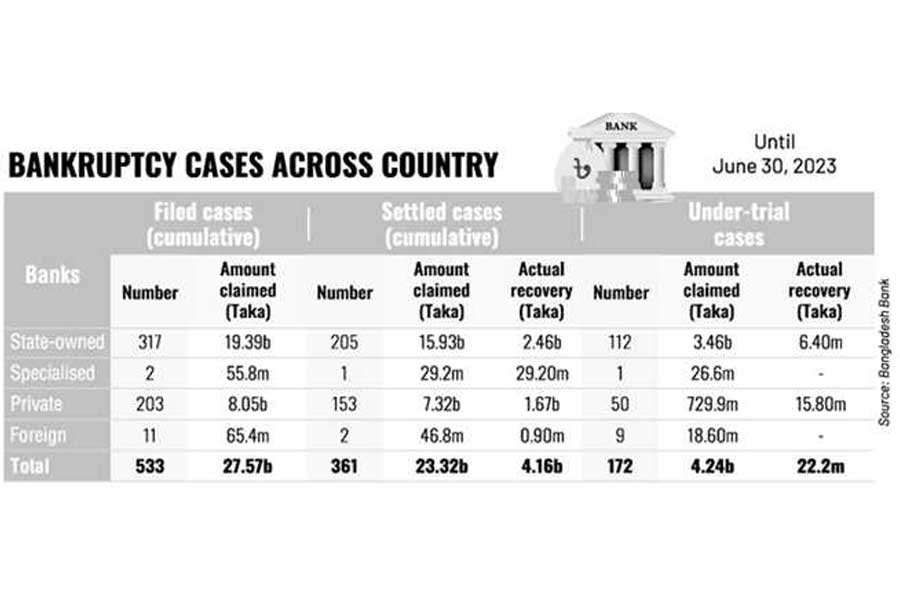
Published :
Updated :

Bangladesh's banking sector is struggling to recover loans from defaulting companies and individuals through bankruptcy courts, having realised only over Tk 4.16 billion in the past 26 years to June 2023.
The number of under-trial cases stands at 172, with the banks claiming an estimated amount of Tk 4.24 billion as of June 2023, according to the latest report of Bangladesh Bank (BB).
In the past 26 years, 361 such cases have been settled, with the claimed amount totalling Tk 23.32 billion.
Different state-owned banks, private commercial banks, specialised banks, and foreign banks filed lawsuits to recover the default loans.
Since the enactment of the Bankruptcy Act in 1997, a total of 533 cases have been filed against various individuals and companies up to June 2023.
Banks grappled with approximately Tk27.57 billion tied up in these cases as of June 2023 since the enactment of the law.
However, the resolution process has been notably slow; only 361 cases were settled from 1997 to June 2023, highlighting the challenges faced in expediting these proceedings.
Despite the relatively low number of cases being settled, the legal landscape surrounding bankruptcy continues to be a focal point, necessitating further scrutiny and potential reforms to expedite the settling process.
Legal experts and economists stress that expedited resolution, alongside legal reforms, is essential to restore investors' trust, encourage economic activities, and ensure sustainable financial growth.
The sluggish progress demands immediate attention from policymakers to safeguard the country's economic trajectory, they viewed.
They underscored the need for comprehensive reforms to expedite these cases, suggesting stricter regulations, streamlined procedures, and enhanced judicial support.
Without swift action, the sector risks prolonged financial strain, affecting both banks and the broader economy.
The spokesperson and executive director of BB, Md Mezbaul Haque, emphasised that the number of bankruptcy cases being filed in courts remains low because banks are hesitant to pursue these cases.
Haque clarified that the poor recovery of loans is beyond their control, as only the courts concerned have the authority to settle and recover default loans through legal proceedings.
"The banks are not considering going to the bankruptcy courts in good numbers to file the cases as they deem it as not viable or effective option to recover the default loan", he told the FE.
He said, "Real recovery of claimed loan by the banks is not substantial as banks filed the cases by calculating unapplied and penal interest that surged the claimed amount."
"Citing this one of the reasons for real recovery as low, the BB spokesman said, "The courts might consider reducing the claimed amount of banks whenever it declares judgement."
Addressing the situation, Haque urged banking authorities to adhere to credit risk guidelines when approving loans, as this could prevent the approval of risky loans in the first place. He also emphasised the importance of banks closely monitoring and supervising ongoing cases efficiently to enhance the chances of successful recovery.
Syed Mahbubur Rahman, managing director (MD) and CEO of Mutual Trust Bank, stated that filing bankruptcy cases is not a practical or preferable solution for banks and non-bank financial institutions.
He highlighted that the existing law does not facilitate effective or smooth loan recovery through courts, leading to a significantly low actual recovery of loans.
Rahman contended that banks might consider pursuing bankruptcy cases if the current bankruptcy act undergoes a comprehensive overhaul, similar to the Indian insolvency law.
He stressed the need for the government to improve the capacity of courts and ensure streamlined case proceedings to make the legal process more efficient.
Zahid Hussain, former lead economist at the World Bank's Dhaka office, expressed concern about banks developing a habit of allowing default loans to accumulate and grow.
He stressed the need for well-intentioned amendments to the law to ensure its effectiveness and fairness.
According to him, the country possesses abundant technical expertise to enact or amend laws.
Hussain underlined the importance of reforming the law and strengthening institutional capacity.
He highlighted the existence of globally recognised best practices, including those from India that can be utilised to make the law contemporary and efficient.
sajibur@gmail.com


 For all latest news, follow The Financial Express Google News channel.
For all latest news, follow The Financial Express Google News channel.